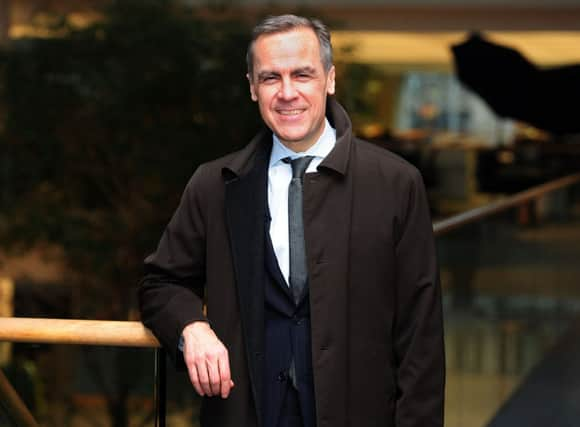Leaders: Carney brings clarity to currency debate


Mr Carney spelt out some of what he sees as the unavoidable implications of the SNP’s desire for a currency union with the rest of the UK (rUK) after Scottish independence. It was not for the Governor of the Bank of England to say whether independence would be a good or a bad thing. Rather, Mr Carney deftly avoided overt political comment and concentrated instead on the technical implications for the Bank of such a union.
Those technicalities are, however, hugely significant for the political debate in Scotland. Because they help define the nature of Scotland’s financial independence – or, perhaps more accurately, dependence – after a Yes vote in September. For a sterling zone to work, said Mr Carney, there would have to be some ceding of sovereignty.
Advertisement
Hide AdAdvertisement
Hide AdThis seems entirely reasonable. If the Governor of the Bank of England is to have effective control of monetary policy in a sterling zone, it makes sense that he has to be able to exercise influence throughout that zone.
And if Mr Carney is to be the lender of last resort within that zone, he cannot be expected to have that responsibility without commensurate powers. It would be naive to think otherwise.
However, Mr Carney’s clarity has it limits. What we still do not know is precisely what aspects of sovereignty he means.
It would stand to reason this would include interest rates – they are, after all, one of the key levers of macro-economic policy.
But what else? Would Mr Carney have the power to set public spending limits north of the Border? Could he limit the level of borrowing by a Holyrood government? What about the scale of welfare spending? What about levels of corporate and personal taxation?
If Mr Carney is to be the arbiter of some or all of these, to what extent could a nominally independent Scottish Government be regarded as the master of its own fate? If Threadneedle Street’s influence was so intrusive, could it really be termed independent?
Mr Carney, of course, is far too smart to be drawn on any of these questions. Ultimately, he serves political masters. Any sterling zone following the break-up of the United Kingdom would be run under an agreement between the governments of the two countries.
So, what use will the politicians of Holyrood and Whitehall make of all this? The SNP’s John Swinney last night seemed wholly relaxed about the entry requirements for a sterling zone. The Treasury, however, believes such an agreement “unlikely”.
Advertisement
Hide AdAdvertisement
Hide AdIn September, we find out the voters’ view. Mr Carney’s visit yesterday was indeed a useful one.
Fishing about for next food scandal
WHEN you have a nice piece of fish for dinner, how long is it since that fish was swimming in the sea? And how many miles has that fish travelled between net and plate?
These questions, says the Marine Conservation Society, could be about to make seafood the next crisis of consumer confidence in the food chain, after the horsemeat scandal.
In January last year, the discovery of horsemeat in supermarket processed meat products led to a nationwide reappraisal of exactly what goes into the convenience foods we eat. It was an eye-opener for many consumers, and had a material effect on shopping habits as people looked for greater certainty about the provenance of their food.
Quite understandably, they wanted to have the very basic reassurance that dishes contained what the label claimed, and nothing else.
With seafood, the issues are slightly different. The concerns are less to do with a dish containing something that isn’t on the list of ingredients on the packet. Instead, they focus on where and when the fish was caught; how sustainable that fishery is for that kind of fish; where it was transported to be processed or packed; and the number of airmiles it clocked up along the way.
The key to this is traceability, and it seems some of Britain’s supermarkets are more willing than others to be upfront about where their seafood comes from.
Of course, some families on a tight budget may be primarily interested in price, not provenance. But if the horsemeat scandal taught us anything, it is that even the cheapest “value” meals have to conform to basic standards. That applies to fish as well as meat.